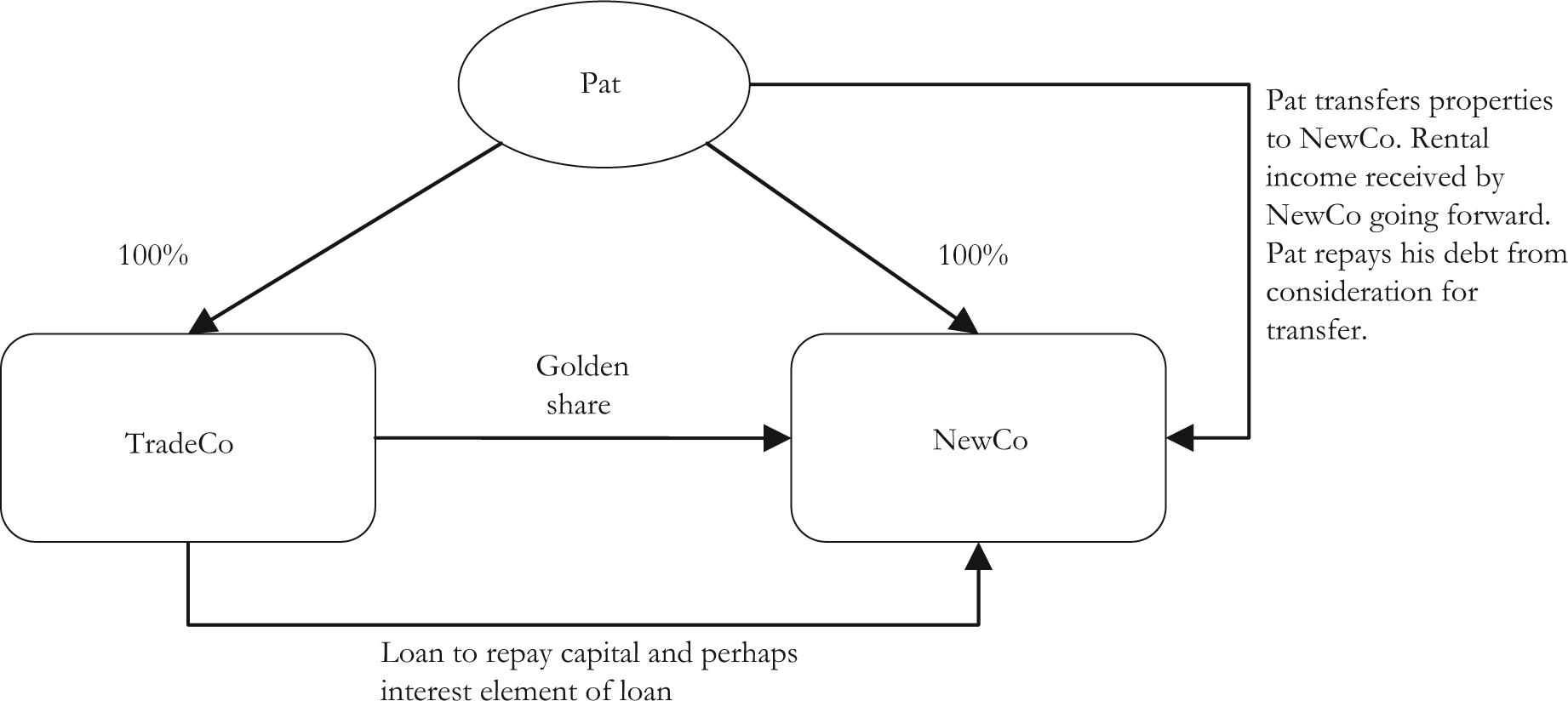Tax and Personal Debt
It is not uncommon for an advisor to be faced with a client with significant personal debt issues. Often the debt was drawn down to finance investments in property at home or abroad. These investments were made during a rising property market and often without consideration as to how the debt would eventually be repaid absent a sale of the property. A sale of the property may now not be possible or desirable due to significant negative equity. Banks are now pressing borrowers for interest and capital repayments which may have to be financed by the client from their own personal income or reserves; this brings with it significant tax costs.
It is worthwhile considering whether it is possible to restructure the financial affairs of the client to reduce the tax burden associated with paying down their debt. The following example examines how such a restructuring may be undertaken.
Example
Pat purchased a number of residential properties which he lets out, the original cost of the properties amounted to €3m. The properties are now valued at approximately €2m. To purchase the properties, Pat borrowed from the bank. The outstanding debt now amounts to €2m as Pat made a number of capital repayments over the years. Pat is now under significant pressure to increase his capital repayments on the loan as well as discharging the interest costs.
Pat is the sole shareholder in his trading company (“TradeCo”), the company is profitable and is Pat's main source of income. Pat is taking significant drawings from TradeCo to fund his loan repayments. Payroll taxes must be operated at source which is adding to Pat's cash-flow difficulties. To finance €2m of capital repayments on his loans Pat must draw approximately €4m from TradeCo and suffer €2m in tax (assuming a tax rate of 50%). Clearly this is not sustainable or efficient.
Proposed Restructuring
It is proposed that the following steps be taken:
- Pat incorporates a new company (“NewCo”), Pat is the sole shareholder;
- Pat disposes of his properties to NewCo and repays his bank debt. It may be possible for NewCo to assume Pat's debt in consideration for the property transfer, however, in practice a drawdown of fresh facilities by NewCo is the most likely route forward;
- TradeCo takes a Golden Share in NewCo, this will allow for inter-company loans without breaching company law;
- TradeCo loans funds to NewCo to service its debt.

By packaging the asset and debt into NewCo, Pat now enjoys a much more manageable situation. To finance the loan repayments NewCo can simply draw funds in the form of a loan from TradeCo, there is no longer a need for Pat to draw a salary from TradeCo to finance his loan repayments. The advantage is that the debt could be serviced by TradeCo out of income taxed at 12.5% rather than financing the debt from income subject to tax at circa 50%.
The consent of the bank to the proposed transfers is likely to be required. It would seem that the position of the bank is strengthened significantly as Pat's ability to repay his debt is enhanced. In practice the banks are willing to facilitate a reorganisation provided that their position is not compromised.
A high level tax analysis of such a reorganisation is outlined below.
Capital Gains Tax
Pat will realise a significant loss on the disposal of the properties to NewCo. As the loss would be incurred on a sale to a connected party, section 549 TCA 1997 will ring-fence the loss for use only against future gains on a disposal by Pat to NewCo.
Stamp Duty
Prior to Budget 2011 stamp duty presented a significant obstacle to the completion of these reorganisations as invariably the client would not have sufficient funds to finance the duty arising. Budget 2011 reduced the rate of stamp duty on residential properties; stamp duty at 1% will apply on all sales of residential properties up to a value of €1m, where the value exceeds €1m a 2% rate of duty will apply on the value over €1m.
Where the consideration for the transfer is the assumption of a debt by NewCo section 41 SDCA 1999 may have application. Where property is conveyed and the debt is a mortgage, duty is charged on the higher of:
- The value of the mortgage debt assumed plus any consideration paid, or
- The equity of redemption.
Where the value of the mortgage assumed is greater than the value of the property (i.e. a negative equity situation) Revenue may, in practice, limit the duty to the value of the property provided a good case can be made to do so.
Where the duty arising is significant it may be possible to “rest in contract”.
VAT
On the basis that the properties in question are residential properties and that Pat had no waiver of exemption in place, there should be no VAT implications on the transfer of the properties to NewCo.
Capital Acquisitions Tax
Private companies are look through entities for CAT purposes (section 43 CATCA 2003). In this case, as TradeCo and NewCo have only one shareholder (Pat), no CAT should arise on the proposed restructuring. However, where there is more than one shareholder involved or where the property is held in joint names etc some of the gift tax issues that could arise include:
- The transfer of assets into the company (in this case NewCo) at under or over value could give rise to cross gifts between shareholders;
- If the funds to finance the debt are provided free from interest (in this case by TradeCo) a gift may arise as the property holding company (in this case NewCo) has a free use of money.
Income Tax
Where a member of a company transfers an asset to that company at overvalue a distribution subject to income tax may arise (section 130 (3) TCA 1997). In this case Pat is transferring the properties to NewCo at their market value, accordingly, no distribution should arise. In practice Pat should obtain an independent valuation from a reputable valuer to support the transaction, where there is any element of doubt more than one valuer could be used.
It is commonplace nowadays for the quantum of the debt to exceed the value of the property. It is suggested that in such circumstances the following remedies may be taken to avoid a distribution occurring:
- An asset with some value may be packaged together with the property to make up the full value of the loan (i.e. the value of the asset is increased to match the consideration), or
- A portion of the debt may not be transferred to the company (i.e. the consideration is reduced).
Company Law — high level summary of main considerations
A “Golden Share” arrangement may be required between TradeCo and NewCo to avoid a breach of section 31 CA 1990 by reason of the lending of money from TradeCo to NewCo. A “Golden Share” provides the holder of the share (in this case TradeCo) with the right to control the board of the subsidiary company (in this case NewCo), thus the companies will constitute a group for the purposes of the Companies Act.
Section 29 CA 1990 provides that a company cannot enter into any arrangement with a director of the company, unless the arrangement is first approved by a resolution passed by the shareholders of the company. Such a resolution must be made for the purposes of the property transfer to NewCo as the company is entering into a transaction with its director (Pat). A transaction entered into in breach of the above requirement would be voidable by the company subject to certain exceptions.
A solicitor should be consulted to advise on all of the legal aspects of the reorganisation (e.g. security, conveyancing etc).
Conclusion
The example outlined above may apply to clients with a degree of flexibility with regard to their financial affairs. The tax saving over the life of the loan would amount to circa €1.8m in the example outlined above, clearly this is attractive. Clients with unincorporated businesses may consider incorporation to avail of the benefits offered, alternatively existing “service company” structures could also be adapted to suit.
The tax analysis outlined above is high level in nature and all potential tax liabilities or opportunities may not have been identified. Tax and legal advice should be sought before implementing such a reorganisation.
Mark Doyle is Tax Director with Grant Thornton Financial and Taxation Consultants Limited.
Email: Mark.Doyle@ie.gt.com

